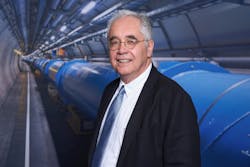Costas Fountas to become 25th president of CERN
The CERN Council elected Professor Costas Fountas as its 25th president, for a period of one year, renewable twice, with a mandate starting on January 1. He will take over from Professor Eliezer Rabinovici, who concludes his term at the end of December.
CERN, the European Organization for Nuclear Research, is the world's most well-known laboratory for particle physics and home of the large hadron collider (LHC), the world’s largest machine. The organization is located on the French-Swiss border, with its headquarters in Geneva.
“Professor Fountas is an experimentalist of the highest caliber, who has played key roles in the CMS collaboration at the LHC and also in the former ZEUS collaboration at DESY in Germany. As vice president of the CERN Council since 2022, his professionalism and advice have been of great benefit to discussions, and I am confident that he will make an excellent president at this very important time for the long-term future of the organization” said Rabinovici.
Fountas is professor of physics and heads the high-energy physics group at the University of Ioannina in Greece. After completing his PhD at Columbia University in 1989, studying neutrino production at the Tevatron, he worked on the data-acquisition electronics for Fermilab’s CCRF experiment. He then moved to the University of Wisconsin and worked on the trigger system of the ZEUS experiment at DESY. In 2000, he started work at Imperial College London and joined the CMS collaboration where, among several roles, he took responsibility for the design and implementation of the global calorimeter trigger; his group also developed the first model of the CMS track trigger. Later, based at the University of Ioannina, he developed and built the CMS barrel muon track finder using field-programmable gate arrays (FPGAs) and optical-link technologies. At the LHC his physics interests have focused on jet cross sections and searches for new fundamental interactions.
Alongside his expertise in delivering detector systems and conducting physics analyses, Fountas has held several management roles in CMS and been a member of many councils and advisory committees. He was appointed Greek scientific delegate to the CERN Council in 2016 and vice president of Council in 2022.
“My focus will be to support the CERN Management and the experiments so as to ensure that the high-luminosity LHC is completed successfully and in a timely manner. I will also make sure that discussions on the next major project at CERN are held in such a way that everybody has a voice. It is a critical time for CERN, and, as president of council, my commitment will be to do everything I can to bring consensus and guarantee the brightest future possible for the Organization,” said Fountas.
CERN Council is the supreme decision-making authority of the organization, composed of delegates of all its 24 member states.

